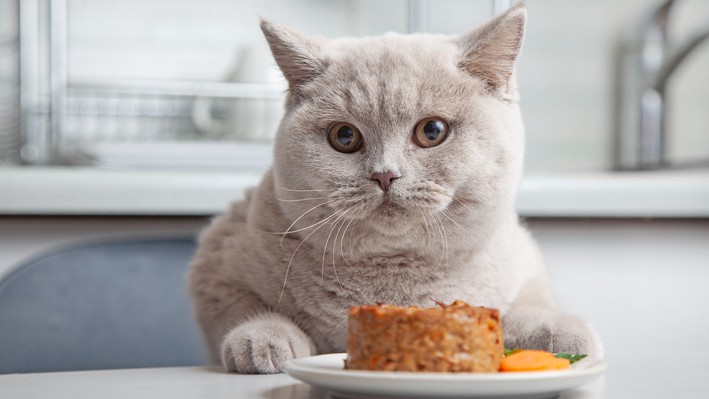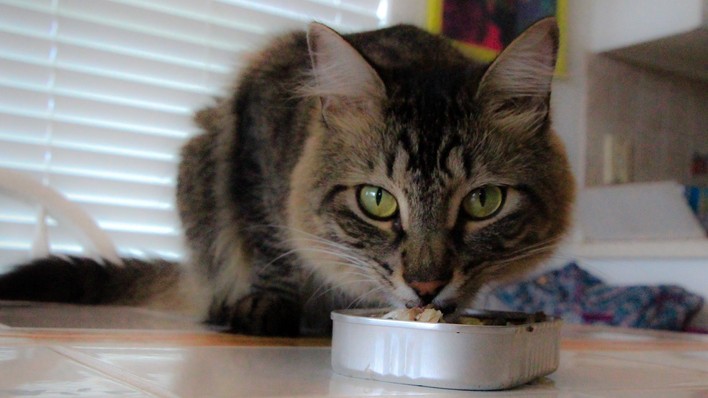Is tuna good for cats? A vet answers
Is tuna good for cats? We sought the advice of expert vet Dr. Elizabeth Racine to find out!

Get the best advice, tips and top tech for your beloved Pets
You are now subscribed
Your newsletter sign-up was successful
Is tuna good for cats? The answer is yes, but only when consumed as a treat and in small amounts. Unlike the best cat food which comes packed with everything your feline friend needs to thrive, tuna on its own is not nutritionally balanced and therefore it can’t be fed to your cat as their primary source of nutrition.
When it comes to the question of ‘what human foods can cats eat?’ tuna makes the list of safe snacks. However, it’s important to avoid tuna in brine, which has a very high salt content, and tuna in oil, which is high in fat. Instead, opt for tuna packed in spring water and stick to a cat-friendly portion.
For everything you need to know about feeding tuna to your cat, we turned to the expertise of Dr. Elizabeth Racine. Below, you’ll find her advice on portion sizes, which cats should steer clear of this fishy treat, and whether mercury poisoning is something you need to be worried about. Let’s take a look…

Dr Elizabeth Racine graduated in 2017 as a Doctor of Veterinary Medicine. She now specializes in veterinary behavior, nutrition, and internal medicine. Dr Racine also works as a freelance writer, writing for major companies in the industry such as the American Kennel Club.
Tuna is okay for most cats in small portions
For most cats, tuna is an acceptable snack as long as it is not their only source of food. Tuna is not a complete and balanced diet, and should not be fed as a full meal. If your cat is healthy and tolerates tuna well, a small amount of tuna as an occasional treat should not cause any harm.
Some cats who are not used to tuna may experience some mild gastrointestinal upset, such as vomiting and diarrhea, after eating it. In these cases, it may be best to discontinue feeding tuna, or to try starting out with very small amounts at first to allow the cat time to get used to it. Over time, the cat may adjust and may be able to enjoy larger portions without stomach upset.
Tuna may be bad for some cats
Although tuna is a healthy snack for most cats, for some cats it can cause problems. Cats with certain health issues, such as inflammatory bowel disease, should not eat tuna because it may cause flare-ups. Cats on special diets, such as those with food allergies or those on a low iodine diet for hyperthyroidism, should also not eat tuna because it will interfere with the balance of their diet.
If your cat has medical problems or is on a special diet, ask your veterinarian before feeding tuna to your cat. It’s always a good idea to check with your vet before feeding anything new or unusual to your cat!
Get the best advice, tips and top tech for your beloved Pets
Can cats get mercury poisoning?
Yes, unfortunately, cats can get mercury poisoning just like other animals – including humans – can. However, your cat would have to be eating a lot of tuna to consume enough mercury to result in a toxic level of mercury in his or her body. It is very rare for a cat to get mercury poisoning from eating tuna.
Common symptoms of mercury poisoning include neurologic signs such as blindness, weakness, incoordination, abnormal behavior, tremors, nystagmus, and convulsions. If your cat displays any of these symptoms, it is important to see your veterinarian right away. Even if your cat doesn’t eat tuna, these symptoms can be signs of a serious medical condition and your cat needs veterinary care immediately.
Tuna is not a complete and balanced diet

Most importantly, tuna by itself is not a healthy diet for your cat. Tuna alone does not provide all the vitamins and minerals your cat needs, which can lead to serious health problems long term. Your cat should always eat a commercially manufactured cat food that is complete and balanced, meaning it provides the right amount of nutrients for your cat’s current life stage. While tuna flavored cat foods are just fine for your cat as long as they meet your cat’s current nutritional needs, tuna alone does not have enough nutrients to sustain your cat’s health long term.
To learn more about choosing an appropriate diet for your cat, ask your veterinarian for product recommendations or check out these resources on choosing a pet food from the Tufts Clinical Nutrition Service Tufts Clinical Nutrition Service or from the World Small Animal Veterinary Association (WSAVA) World Small Animal Veterinary Association (WSAVA).
Limit tuna intake for your cat’s health
Although tuna is a safe and acceptable treat for your cat, it’s important to limit your cat’s intake of cat treats and snacks for his or her overall health. A good rule of thumb is to limit treats – including tuna! – to no more than 10% of your cat’s total calorie intake for the day. This 10% should include all foods outside your cat’s regular cat food, including treats, table scraps, food toppers, supplements, hunting, and any other sources of extra food.
If all these food sources account for more than 10% of your cat’s daily calorie intake, your cat is at risk for becoming overweight or even obese. Obesity in cats can lead to a number of health issues, including cardiac disease, diabetes, and arthritis. If your cat is already overweight, skip the tuna and read our guide to weight loss for cats. Your cat will thank you!
Is tuna good for cats? Always check with your vet first
Tuna is a safe and reasonably healthy snack for most cats, but should never be used as a full meal because it is not complete and balanced. In general, tuna should not make up more than 10% of your cat’s daily calorie intake. Some cats may not be able to eat tuna safely, so always check with your veterinarian first before feeding a new product to your cat if your cat has a health condition or is on a special diet. Otherwise, it should be okay for your cat to enjoy small amounts of tuna as the occasional treat. If you have questions about your pet’s diet, your veterinarian is the best resource to help you ensure that the diet you are feeding is complete and balanced and appropriate for your pet’s current life stage.
Now that you know the answer to whether tuna is good for cats, you may be wondering if a more natural diet is best for your feline friend. Take a look at the benefits of raw cat food to find out if a diet like the one their ancestors ate is right for your kitty. Or, check out our feature that answers, 'Is it healthy for cats to eat fish?'
Dr. Elizabeth Racine is a small animal general practice vet covering all things pet health and wellness. Her special interests include veterinary behavior, nutrition, and internal medicine.
As a freelance writer, Dr. Racine has written content for major companies in the industry such as the American Kennel Club, Merck Animal Health, Bayer PetBasics, Elanco, and CareCredit. In her free time, Dr. Racine enjoys playing trampoline dodgeball, hiking with her beagle Dasher, and spending time with her three mischievous cats.
